- What John Lennon Thinks of Donald Trump - November 14, 2016
- The Meaning of Fun: The Paul is Dead Rumor - February 3, 2016
- BEATLES-STREEP-SHEA SHOCKER: IT’S NOT HER!!!! - August 13, 2015
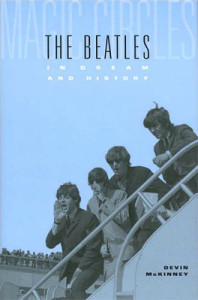
In Magic Circles: The Beatles in Dream in History, I wrote at length about the Paul is Dead (PID) rumor, attempting to weave it into a larger comprehension of the Beatles’ unprecedented, and exceedingly bizarre, effect on the private and public fantasies of the Sixties (and beyond). The rumor occurred at precisely the same time as the Manson Family murders, and my hunch for many years had been that their proximity beggared coincidence. That both were cults, both expressions—one benign, the other psychotic; one symbolic, the other brutally physical—of desires and fears accumulating at that instant in history; that those desires and fears were culturally pervasive enough to be shared by both middle-class college students and dropout zombie killers; and that such expressions found their natural vehicle, as other fears and desires had done throughout the Sixties, in the Beatles.
PID came up at Hey Dullblog the other day, and the subject gave me a little rush, as it always has. I find it an inexhaustibly entertaining aspect of Beatledom, and have never understood those who get worked up against it. Conspiracy nuts? They’ve always existed. As a specific event in its historical context, PID is both fun (because unlike, say, the JFK assassination, it involves no actual death) and meaningful (because it involves a mass fantasy of death). As one who knows that societies have always created myths and accepts that social psychology is an actual thing, I find PID significant as a modern myth of death and regeneration, a collective creativity in the midst of failure and decay. It’s about the end of the Sixties, and it marks the birth of the Beatles as a post-Beatles, fan-constructed phenomenon. (It is, in a way, the first Beatle mashup.)
At Mike’s suggestion, I’m posting the lead-in to my PID exegesis. It’s for those who share my enthusiasm and are curious about a perspective which tries to extract meaning while not shortchanging entertainment. Which embraces the rumor as something both fun and meaningful, both mysterious and accessible—because that’s what the Beatles were, if they were anything at all.
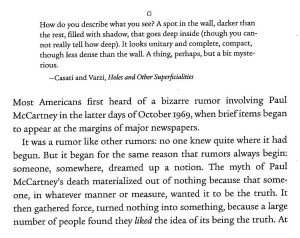
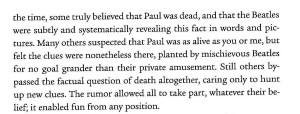
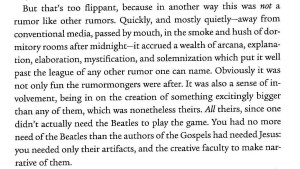
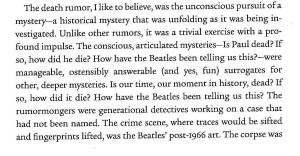



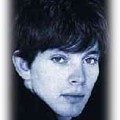
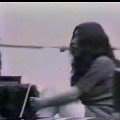

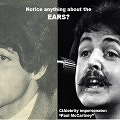

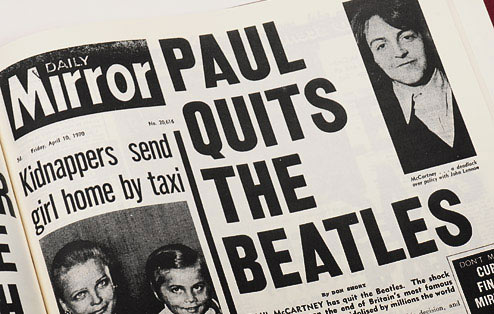


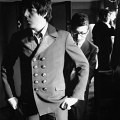
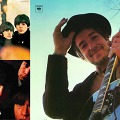
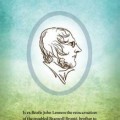
“In “Magic Circles: The Beatles in Dream in History’ …”
.
O man. Wait’ll Devin finds out you got his subtitle wrong. He hates that.
.
For the record: It’s ‘Magic Circles: *In* Beatles in Dream in History’
Such an interesting perspective, Devin. I was a young teenager when the PID stuff started. It was great fun listening to songs backwards and checking out album covers for secret messages. Otis Redding was another artist whose music got the secret message treatment. If I recall correctly, he had recently drowned around the time his hit single, “Sittin’ On The Dock Of The Bay” was released. Everyone played that record on 33 rather than 45 to hear his secret message from the grave. 🙂
.
At the time, as I said, it was all great fun. I don’t recall anyone taking it seriously. It seemed to be part of teen slasher culture, which was getting its legs in the late 60’s and early 70’s.
“As a specific event in its historical context, PID is both fun (because unlike, say, the JFK assassination, it involves no actual death) and meaningful (because it involves a mass fantasy of death).”
.
You put that well, Devin. I think the “fun” part is especially important.
.
I think PID continues to be so involving to many (both those interested in social psychology, who recognize it as a myth, and true believers) because it’s the shallow, enjoyable end of the conspiracy theory sandbox. Poring over album sleeves, backwards lyrics, and Beatles photos is more fun than pondering the intricacies of, say, the JFK assassination — and it’s safe. I bet even the most zealous PID believers recognize, at some level, that they’re highly unlikely to get on the FBI’s or MI5’s radar for spouting off about McCartney’s alleged death.
.
I also agree with you about the impulses that underlay the myth at the time of its surfacing: “The corpse was the world their generation had dreamed, and so very nearly fought into being.” My own sense of why the rumor persists today is that it’s a handy screen on which people can project their anxieties about the media, celebrities, and the fact that so much of our knowledge of the larger world comes at second or third hand.
@Guys, I think it’s impossible to understand the PID phenomenon outside of the context of the assassinations of the 60s, and more precisely, their impact on the student generation.
Most people when talking about this topic are sloppy and inaccurate, defaulting to windy proclamations about “conspiracy thinking” or “people’s inherent need to make sense of the world” or “the perverse comfort that people take in the idea that a shadowy cabal is running everything.” That’s like trying to explain the explosion of rock music after 1964, not by talking of the Beatles and Beatlemania, but by mentioning “the human organism’s inherent attraction to four-person musical combos.”
I also marked this marvelous bit: “The corpse was the world their generation had dreamed, and so very nearly fought into being.”
Wonderful writing as ever, Devin. But to me it begs some questions: Did that generation nearly fight it into being? Or did a set of individuals nearly fight it into being? And why didn’t it happen? Did the generation go away? No, it didn’t. Certain people went away. The generation remained, but they largely lost heart. Why did the generation lose heart?
I forget who said this, but I’ve always remembered it: “After the Sixties, the right wing gave us pop culture, but took over everything else. And convinced us that pop culture was all that mattered.” What PID is about, to me, is the reaction of a traumatized generation, looking at their one area of strength left (pop culture), and assuming that too, must be manipulated, a lie. Just as the New Frontier turned to Dallas, Beatlemania would inevitably turn to something darker because we can’t have nice things.
To be a student in 1969 was to live in a world of plot and counterplot, some very definitely real. In a world where a paranoid government was infiltrating college groups, and students were bombing things and hitting the Ten Most Wanted List, what idea was too crazy? A lot of stuff dismissed as “hippie paranoia” or published in the underground press, later turned out to be (gulp) true. (These things, for example.)
The Baby Boomers had had a very thorough education in “deep politics.” It was only natural for them to generate, then add to, a synthetic mystery involving their primary generational obsession. And also — everybody was smoking a lot of pot.
PS — Deep politics has been explained thusly: “If what is generally referred to as ‘politics’ is the 10% of an iceberg that is visible above the water, Deep Politics is the 90% which underlies it.”
“After the Sixties, the right wing gave us pop culture, but took over everything else. And convinced us that pop culture was all that mattered.”
.
I think it might have been Frank Zappa who said that, but I’m not 100% sure.
.
No, wait… Zappa said “Government is the Entertainment division of the military-industrial complex.”
.
I’m not sure where your quote came from, but it’s a good one.
The thing I’ve always found interesting about the PID phenomenon is that to my mind, Paul is the only one of the Beatles who looked basically the same through the years. I remember when I was a kid of around 10 first getting into the Beatles and I’d look at pictures of John from the early 60s and late 60s and I just could not believe it was the same person. I mean it literally – my brain couldn’t quite comprehend that mop top John and longhair/bearded John were one and the same. To this day I see the two versions as more than just stylistically – or even philosophically – different. So if there had been some enduring and widespread ‘John died and was replaced’ theory, I’d find it a whole lot more understandable.
I have a wild theory that the PID phenomenon is a very close but alternate reality from a parallel universe leaking through to this one – an alternate reality where Paul did actually die in a road accident in the mid-60s. Perhaps in another parallel universe, the Beatles didn’t split up and stayed together a la the Stones, but rumours persist that John died in 1980 and was replaced by a doppelgänger.
As for a competing “John Is Dead” theory, it really shouldn’t surprise anyone that there is at least one on the Internet. If i can recall, it posits that John was replaced by Ralph Ellis of the Swinging Blue Jeans, to whom John does bear a strong resemblance in some photos.
Absolute ironclad proof is that Ellis left the Swinging Blue Jeans in 1966, which, in an eerie similarity to the PID rumors, is when he is said to have replaced John. Also, both Ralph and John were co-singers and co-songwriters with one other person (Ray Ellis and Paul McCartnety, respectively), and both were right-handed rhythm guitar players from Liverpool!
QED
Sorry, I meant Ray ENNIS. I don’t want the truth to be dismissed because of my previous typo.
[…] conspiracy theories—the idea that John and Paul were lovers, and the granddaddy of them all, the Paul McCartney death hoax—have emerged in the comments of late, and so I wanted to take a moment to share some strategies […]